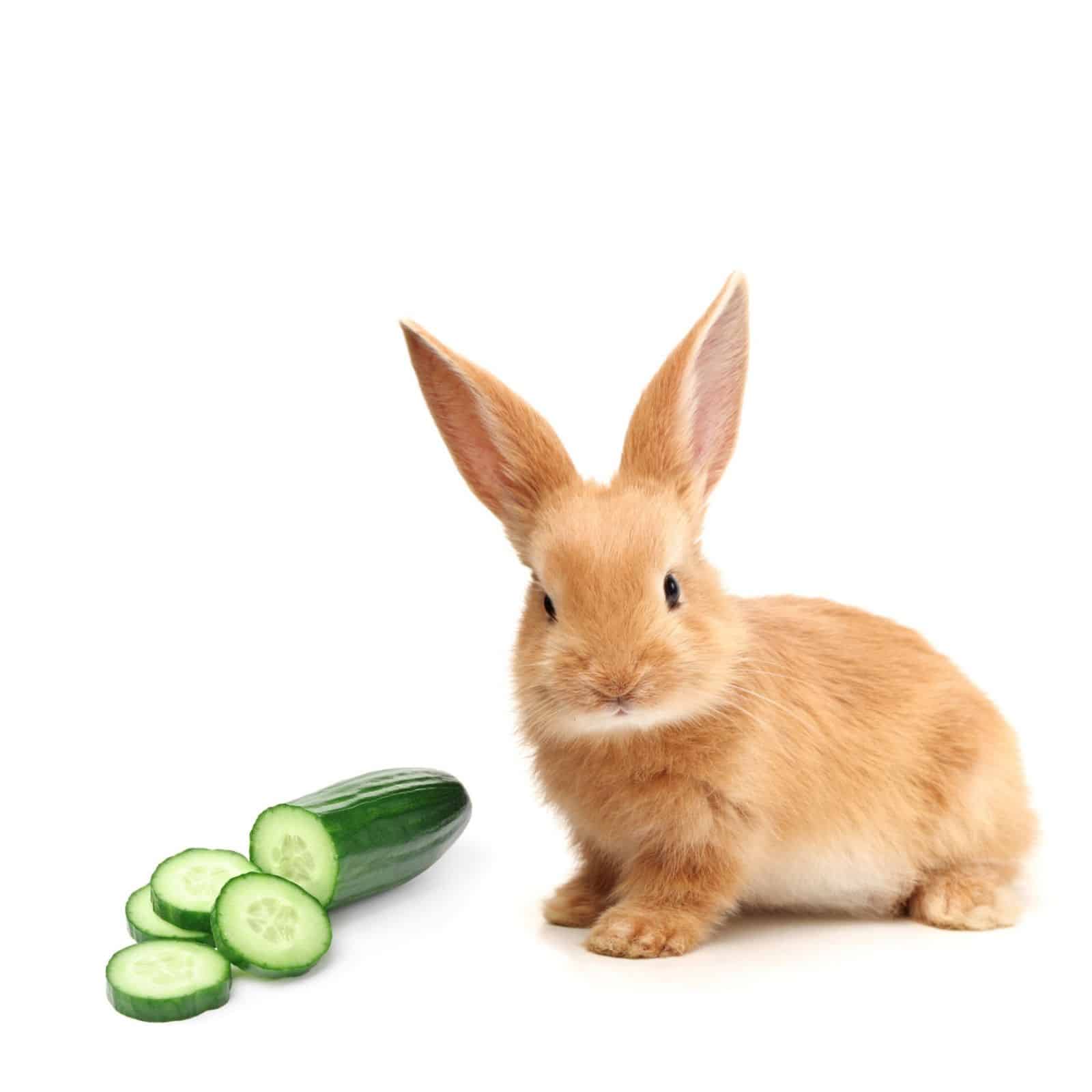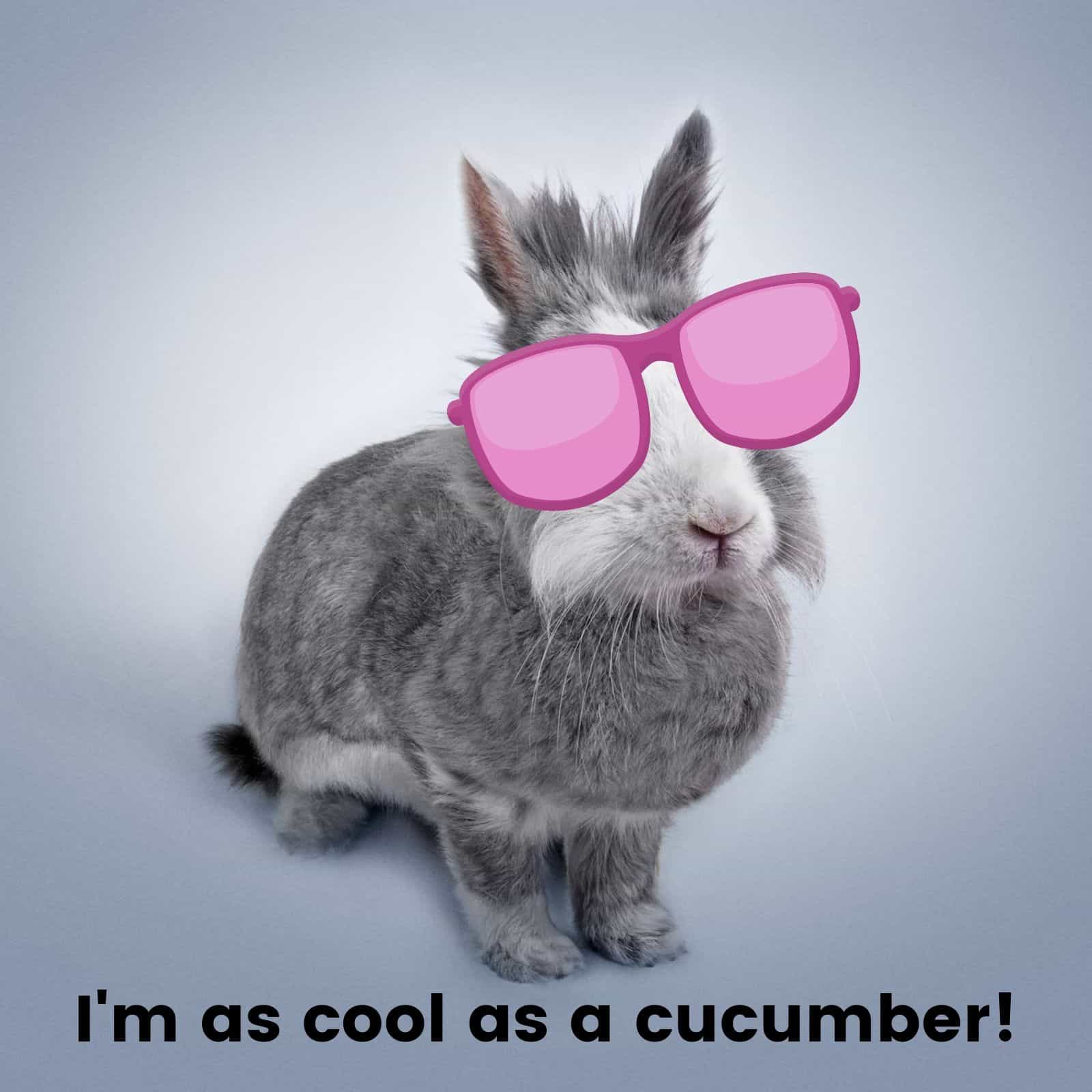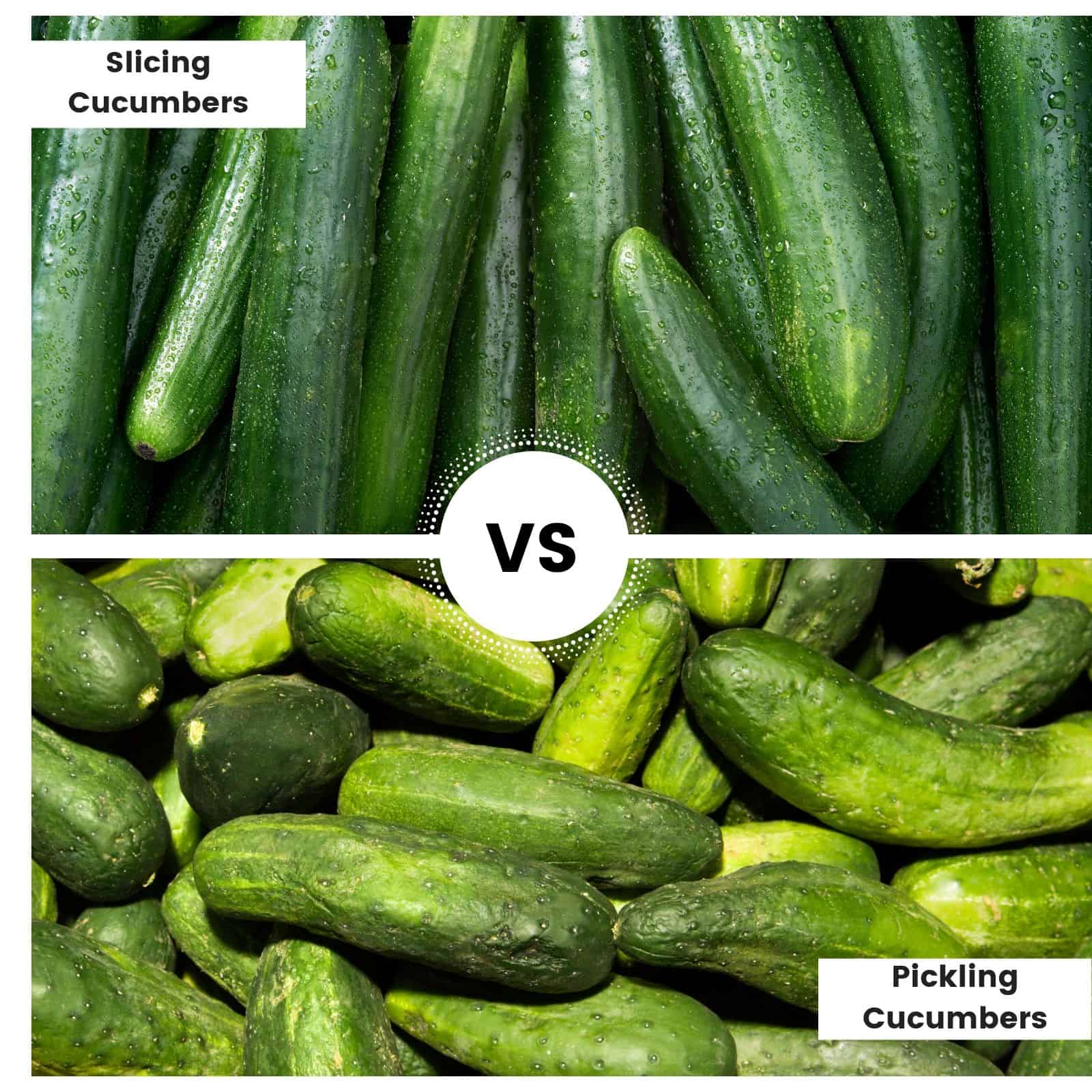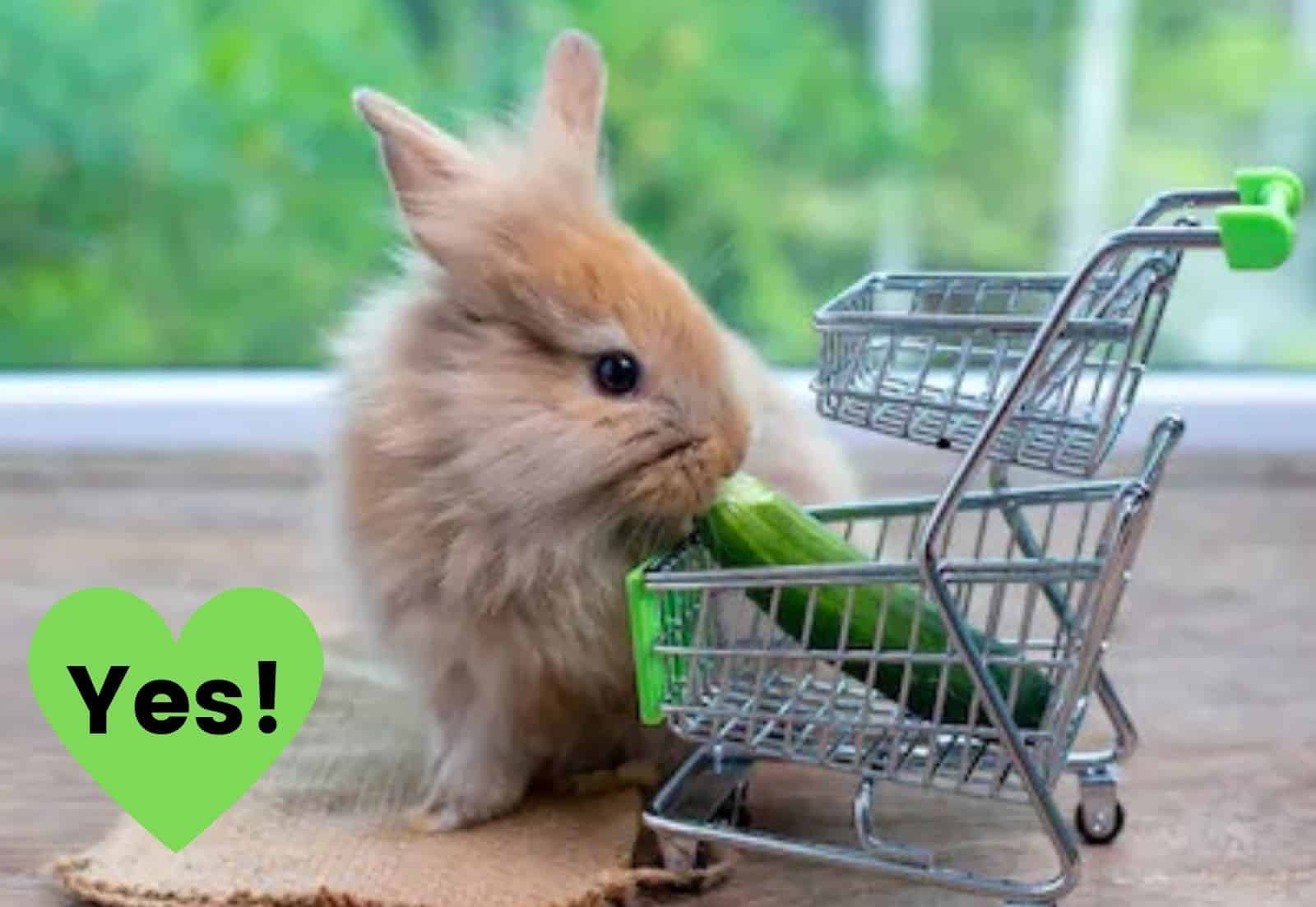Can Rabbits Eat Cucumbers?
Yes, rabbits can eat cucumbers, but they should be eaten in moderation as a treat (except for cucumber leaves which can be fed more often).
Bunnies can consume only 1 – 2 slices of cucumber a week.
To find out more about rabbits and cucumbers, read on.
Contents
1.1 Benefits of Cucumbers for Rabbits
1.5 Cucumbers can provide vitamins and minerals for bunnies
2 Can rabbits eat cucumber seeds?
3 Can bunnies eat the skin and leaves of cucumbers?
3.1 Cons of Cucumbers for Rabbits
4 How many cucumbers can my bunny eat?
5 Cucumbers can impact a bunny’s digestion
6 Can I feed my Bunny Pickles?
8 Tips for feeding rabbits cucumbers:
9 What should you feed your bunny?
Often mistaken for vegetables, cucumbers are actually berries which are fruits that do not have stones or pits, have three distinct layers, have two or more seeds, and come from one flower that has only one ovary.

There are a lot of stipulations to being called a berry!
In fact, many berries are misnamed. Blackberries, raspberries, and strawberries are not actually berries. Instead, they are aggregate accessory fruits which are fruits in which not all their flesh is derived from the ovary.
Conversely, there are many fruits that do not have the word berry in their name that are in fact are berries such as bananas, grapes, tomatoes, and watermelons.
Typically, the seeds of most berries are toxic to rabbits (like tomato and watermelon seeds). However, there are exceptions to this rule (like grape and cucumber seeds).
This means that rabbits can safely eat cucumber seeds but not other berries.
Benefits of Cucumbers for Rabbits
There are several benefits to feeding your rabbit cucumbers.
Water Content
A major benefit of cucumbers is that they are high in water (around 95% water) which helps to keep rabbits hydrated.
Cucumbers are also very refreshing for rabbits in the summer (and for humans too), because their internal temperature is lower than the temperature of the air surrounding them. They typically are around 20 degrees cooler on the inside. Hence, the phrase “cool as a cucumber.”

Low Sugar Content
Cucumbers have a low sugar content compared to other fruits. For example, 100 grams of strawberries have 4.89 grams of sugar, but the same amount of cucumbers only has 1.67 grams of sugar.
This is especially important because rabbits require a high-fiber, low-sugar diet.
Unlike humans, rabbits do not have continual stomach movement to help them digest their food (known as peristalsis). Instead, they rely heavily on fiber to help them digest.
If rabbits eat too much sugar, then not only is it hard for them to digest, but it can also throw off the pH balance in their stomach. This can cause stomach pain, gas, bloating, or diarrhea. Not pleasant at all!
Low in Calories
Cucumbers are also low in calories, which is especially beneficial for rabbits that are overweight. (One cup of cucumbers has only 16 calories.) Overweight rabbits are prone to a variety of health issues, such as flaky skin, breathing problems, and diabetes.
Due to their lower sugar and calorie content, cucumbers make a much better treat option than many other fruits.
Cucumbers can provide vitamins and minerals for bunnies
Another benefit of cucumbers is that they are high in silica, which is a mineral that is essential for developing healthy connective tissues in ligaments, tendons, muscles, cartilage, and bones.
Cucumbers are also exceptionally high in vitamin K, which is essential for bone health and helps with calcium absorption. (Vitamin K and B vitamins are both incredibly important for rabbits’ health).
Cucumbers are also high in vitamin C, which is good for rabbits’ immune systems and overall health. It has been proposed that anxious or stressed rabbits may benefit from having extra vitamin C in their diet.
However, rabbits (unlike humans) can produce their own vitamin C, so they don’t really need to go out of their way to eat it. Also, excess vitamin C can lead to kidney problems. If you are concerned about how much vitamin C your rabbit is getting, please check with your veterinarian.
Cucumbers are also high in potassium, which can help prevent hypokalemia, which is where there are low levels of potassium in the bloodstream. Some common symptoms of hypokalemia are weight loss, muscle weakness, stunted growth, and cardiac arrhythmias.
Can rabbits eat cucumber seeds?
We touched on it briefly before, but another benefit of cucumbers is that their seeds are not poisonous like some other fruits. Instead, they are very nutritious for rabbits and contain several vitamins and minerals.
Not only are they not toxic, but cucumber seeds are also small and soft, which reduces choking possibilities.
Rabbits can also eat not only the seeds, but the flowers, skin, and leaves of cucumber plants as well. Although some rabbits don’t like the taste of cucumber skin (they find it too bitter).
Can bunnies eat the skin and leaves of cucumbers?
You can remove the cucumber skin if your rabbit finds it not to their liking (although a lot of the nutrients are concentrated in the skin).
Since cucumber leaves are edible and non-toxic that leads us into our next benefit: cucumber leaves are also low in oxalates (also known as oxalic acids). Oxalates are organic compounds found in plants that can reduce the absorption of certain nutrients from the digestive system.
If consumed in excess, oxalates can not only limit nutrient absorption but cause kidney damage as well.
Certain foods are high in oxalates, and rabbits can only eat a limited quantity of them such as spinach, beets, sprouts, and parsley.
Rabbits should be eating a small salad daily that is made up mostly of dark, leafy greens.
Since they are low in oxalates, this means that you can feed rabbits cucumber leaves more often without fear of your rabbit consuming too many oxalates or having to worry about not combining high oxalate foods.
However, please remember that your rabbit’s daily salad should contain around five different vegetables that are rotated daily.
Cons of Cucumbers for Rabbits
So far, cucumbers are sounding like the perfect fruit, right?
Sadly, there are some cons to feeding your rabbit cucumbers.
Low in Fiber
One of the biggest cons of cucumbers for rabbits is that they are low in fiber for what rabbits require.
Remember, how earlier we talked about how rabbits do not have peristalsis and require a high fiber, low sugar diet?
Well, cucumbers have fiber, but it is not nearly enough for what rabbits require. They also are too high in sugar for what rabbits need (even though they are low compared to other fruits).
Because of this, rabbits should be fed cucumbers in moderation as a treat.
How many cucumbers can my bunny eat?
Rabbits should be limited to 1-2 small slices of cucumber a week.
Cucumbers is that they can cause diarrhea. Because cucumbers are high in water (which is a good thing), if fed in excess they can cause diarrhea which can then lead to dehydration (the irony!).
As with many foods, it’s all about balance!
Always remember to introduce cucumber slowly into your rabbits’ diet or you may have some unwanted surprises.
Cucumbers can impact a bunny’s digestion
This leads us into the final con of cucumbers: they can cause soft cecotropes (also called caecal pellets or night pellets). Cecotropes are nutrient-rich food particles that are produced by the cecum (a pouch that is at the juncture of the small and large intestines).
Rabbits produce two different types of droppings: fecal pellets and cecotropes.
Fecal pellets are the usual dry, round rabbit poo that you are used to seeing.
Cecotropes are not poo (they are a type of food) and are normally not seen because rabbits typically eat them right away. They are small, soft, shiny pellets that look like bunched grapes.
Rabbits eat these food particles as they exit their anus in a process called cecotrophy. They then re-digest this food in order to get all their necessary nutrients.
When rabbits are overfed foods high in water (like cucumbers) or foods high in sugar or starch, this can lead to soft cecotropes which they are unable to properly re-digest. This is especially bad because rabbits need cecotropes to get their B vitamins (which they cannot produce on their own).
Can I feed my Bunny Pickles?
No. Bunnies cannot eat pickles.
Cucumbers are fruits from the family Cucurbitaceae (try saying that three times fast) which includes pumpkins, watermelons, and gourds. They are known for their crisp, slightly bitter taste and are common salad toppers.
There are two basic types of cucumbers: slicing cucumbers and pickling cucumbers.
Slicing cucumbers are the type most commonly found in grocery stores. They are meant to be eaten fresh and are dark green. Slicing cucumbers are typically longer, have thicker skin, and have tapered edges.
Pickling cucumbers are typically sold at farmer’s markets or specialty shops. They are meant to be eaten pickled (hence why they are known as pickles) and can range in color from white to yellow to green. Pickling cucumbers are typically shorter, have thinner skin, and have ridges or striations.

Please note that you should never feed your rabbit pickles. Instead, feed them raw slicing cucumbers.
Summary

Yes, rabbits can eat cucumbers, but they should be eaten in moderation (1 – 2 slices a week) as a treat (except for cucumber leaves which can be fed more often).
Instead, rabbits should be fed a diet that is mostly hay that is supplemented with pellets and vegetables. Fruits, seeds, and nuts should be considered treats and limited accordingly.
There are some benefits to feeding rabbits cucumbers: they are cool and refreshing, they are high in water, silica, vitamin K, vitamin C, and potassium, they are low in sugar and calories, their seeds, flowers, skin, and leaves are not poisonous, and their leaves are low in oxalates.
There are some cons to feeding rabbits cucumbers: they are low in fiber and high in sugar for what rabbits require, and if fed in excess they can cause diarrhea and soft cecotropes (also called night pellets).
Tips for feeding rabbits cucumbers:
- Always feed rabbits raw slicing cucumbers instead of pickles.
- You can remove the cucumber skin if your rabbit finds it not to their liking (although a lot of the nutrients are concentrated in the skin).
- Remember that your rabbit’s daily salad should contain around five different vegetables that are rotated daily.
- Rabbits should be limited to 1-2 small slices of cucumber a week.
- Remember to introduce cucumber slowly into your rabbits’ diet, or you may have some unwanted surprises.
What should you feed your bunny?
AIW Veterinary Council is a group of certified veterinarians or animal health professionals. We strive to publish information with diverse opinions and multiple citations. All content through the AIW Veterinary Council is either written or reviewed by professionals including but not limited to the people below. Dr. Dilber Hussain is a veterinarian, who studied veterinary medicine at the Sindh Agriculture University Tandojam. After completing the degree, he worked as a veterinary surgeon in different vet surgeries and clinics in Pakistan. He is also working for Animal Welfare and Animal Rights in Pakistan. Besides this, he is giving lectures, some of them at the University of animal sciences, Lahore, and publishing articles about pet health, nutrition, diseases, and animal welfare issues. As an expert and animal rights activist, he often has to be at a court of justice to support lawsuits regarding animal welfare.
Latest posts by AIW Veterinary Council (see all)
- Can Rabbits Eat Watermelon? - November 3, 2022
- What Do Bearded Dragons Eat? - November 2, 2022
- Can Bearded Dragons Eat Grapes? - October 5, 2022